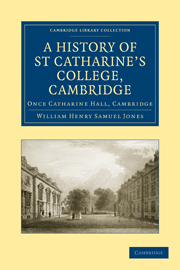Chapter III - Biographical
Published online by Cambridge University Press: 05 June 2011
Summary
Only distinguished members of the College, and no living persons, are included in this list.
Addenbrooke, John. There were three of this name, one who entered in 1671, the second, was the founder of the Cambridge hospital, and a third (B.A. 1711–12, M.A. 1714–15, Fellow 1716). Only the second is deserving of a place here. He was admitted a Pensioner 13 December 1697 and was a Scholar 1702–4, being elected Fellow in 1704. He took the degree of Doctor of Physic 1710–11, and disappears from the list of Fellows 1711–12. A pioneer of the science school at Cambridge, he left his books and cabinet to St Catharine's. The great hospital is his best and greatest memorial. An interesting point in his career is that prior to 1860 he is the only Fellow to take the medical course at Cambridge. The Founder permitted his Fellows to study (for a degree) only philosophy and sacred theology; the Edwardian statutes added “the Arts”, not till 1860 was it strictly legal for a Fellow to study medicine. It is perhaps significant that Addenbrooke ceased to be a Fellow in the year following his taking the degree of M.D. There is an unpublished life of this Addenbrooke by Dr A. W. Langford, which was submitted as a thesis for the Cambridge M.D. An instalment from it appears in the St Catharine's Society Magazine for 1935.
Arrowsmith, John, graduated at St John's in 1619. He became Fellow of St Catharine's in 1623 and vacated his Fellowship in 1631. Regius Professor of Divinity and Master of St John's in 1644, he became Master of Trinity in 1653. He died in 1659.
- Type
- Chapter
- Information
- A History of St Catharine’s College, CambridgeOnce Catharine Hall, Cambridge, pp. 174 - 204Publisher: Cambridge University PressPrint publication year: 2010First published in: 1936



